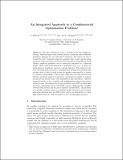Files in this item
An integrated approach to a combinatorial optimisation problem
Item metadata
| dc.contributor.author | Kuster Filipe Bowles, Juliana | |
| dc.contributor.author | Caminati, Marco Bright | |
| dc.contributor.editor | Ahrendt, Wolfgang | |
| dc.contributor.editor | Tapia Tarifa, Silvia Lizeth | |
| dc.date.accessioned | 2019-12-05T10:30:36Z | |
| dc.date.available | 2019-12-05T10:30:36Z | |
| dc.date.issued | 2019 | |
| dc.identifier | 261446208 | |
| dc.identifier | 940bee9e-c321-40d4-8b29-896a70bd39ad | |
| dc.identifier | 85077015792 | |
| dc.identifier | 000611734300016 | |
| dc.identifier.citation | Kuster Filipe Bowles , J & Caminati , M B 2019 , An integrated approach to a combinatorial optimisation problem . in W Ahrendt & S L Tapia Tarifa (eds) , Integrated Formal Methods : 15th International Conference, IFM 2019, Bergen, Norway, December 2–6, 2019, Proceedings . LNCS edn , Lecture Notes in Computer Science (Programming and Software Engineering) , vol. 11918 , Springer , Cham , pp. 284-302 , 15th International Conference on integrated Formal Methods (iFM 2019) , Bergen , Norway , 2/12/19 . https://doi.org/10.1007/978-3-030-34968-4_16 | en |
| dc.identifier.citation | conference | en |
| dc.identifier.isbn | 9783030349677 | |
| dc.identifier.isbn | 9783030349684 | |
| dc.identifier.issn | 0302-9743 | |
| dc.identifier.other | ORCID: /0000-0002-5918-9114/work/65702371 | |
| dc.identifier.other | ORCID: /0000-0002-4529-5442/work/68281662 | |
| dc.identifier.uri | https://hdl.handle.net/10023/19072 | |
| dc.description | Funding: MRC grant MR/S003819/1 and Health Data Research UK, an initiative funded by UK Research and Innovation, Department of Health and Social Care (England) and the devolved administrations, and leading medical research charities. | en |
| dc.description.abstract | We take inspiration from a problem from the healthcare domain, where patients with several chronic conditions follow different guidelines designed for the individual conditions, and where the aim is to find the best treatment plan for a patient that avoids adverse drug reactions, respects patient’s preferences and prioritises drug efficacy. Each chronic condition guideline can be abstractly described by a directed graph, where each node indicates a treatment step (e.g., a choice in medications or resources) and has a certain duration. The search for the best treatment path is seen as a combinatorial optimisation problem and we show how to select a path across the graphs constrained by a notion of resource compatibility. This notion takes into account interactions between any finite number of resources, and makes it possible to express non-monotonic interactions. Our formalisation also introduces a discrete temporal metric, so as to consider only simultaneous nodes in the optimisation process. We express the formal problem as an SMT problem and provide a correctness proof of the SMT code by exploiting the interplay between SMT solvers and the proof assistant Isabelle/HOL. The problem we consider combines aspects of optimal graph execution and resource allocation, showing how an SMT solver can be an alternative to other approaches which are well-researched in the corresponding domains. | |
| dc.format.extent | 19 | |
| dc.format.extent | 375314 | |
| dc.language.iso | eng | |
| dc.publisher | Springer | |
| dc.relation.ispartof | Integrated Formal Methods | en |
| dc.relation.ispartofseries | Lecture Notes in Computer Science (Programming and Software Engineering) | en |
| dc.subject | QA75 Electronic computers. Computer science | en |
| dc.subject | RM Therapeutics. Pharmacology | en |
| dc.subject | T-NDAS | en |
| dc.subject.lcc | QA75 | en |
| dc.subject.lcc | RM | en |
| dc.title | An integrated approach to a combinatorial optimisation problem | en |
| dc.type | Conference item | en |
| dc.contributor.sponsor | Medical Research Council | en |
| dc.contributor.institution | University of St Andrews. School of Computer Science | en |
| dc.identifier.doi | https://doi.org/10.1007/978-3-030-34968-4_16 | |
| dc.date.embargoedUntil | 2019-11-22 | |
| dc.identifier.grantnumber | MR/S003819/1 | en |
This item appears in the following Collection(s)
Items in the St Andrews Research Repository are protected by copyright, with all rights reserved, unless otherwise indicated.

